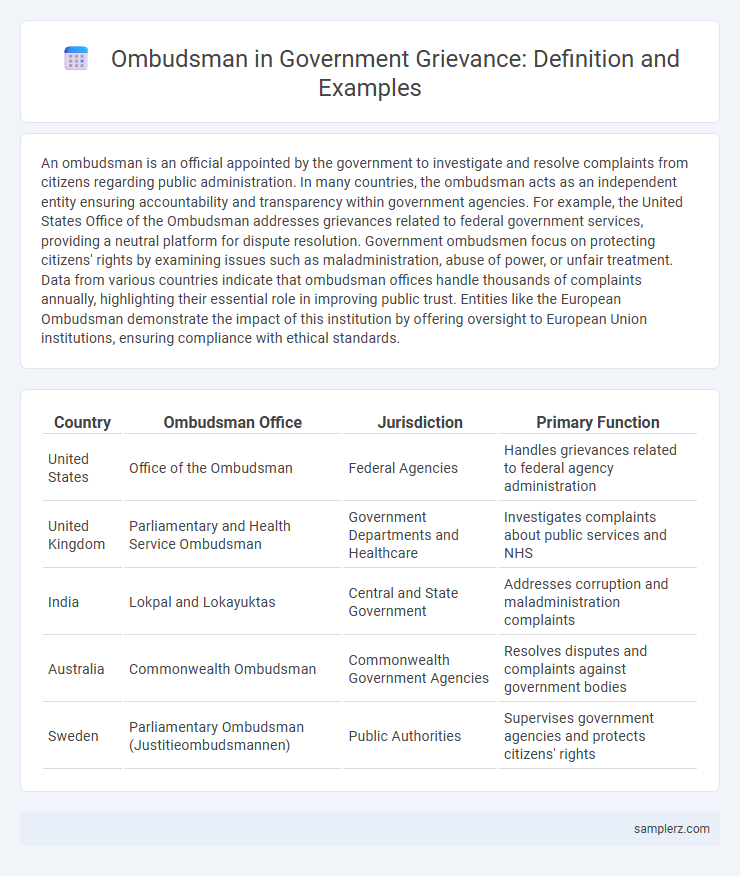An ombudsman is an official appointed by the government to investigate and resolve complaints from citizens regarding public administration. In many countries, the ombudsman acts as an independent entity ensuring accountability and transparency within government agencies. For example, the United States Office of the Ombudsman addresses grievances related to federal government services, providing a neutral platform for dispute resolution. Government ombudsmen focus on protecting citizens' rights by examining issues such as maladministration, abuse of power, or unfair treatment. Data from various countries indicate that ombudsman offices handle thousands of complaints annually, highlighting their essential role in improving public trust. Entities like the European Ombudsman demonstrate the impact of this institution by offering oversight to European Union institutions, ensuring compliance with ethical standards.
Table of Comparison
| Country | Ombudsman Office | Jurisdiction | Primary Function |
|---|---|---|---|
| United States | Office of the Ombudsman | Federal Agencies | Handles grievances related to federal agency administration |
| United Kingdom | Parliamentary and Health Service Ombudsman | Government Departments and Healthcare | Investigates complaints about public services and NHS |
| India | Lokpal and Lokayuktas | Central and State Government | Addresses corruption and maladministration complaints |
| Australia | Commonwealth Ombudsman | Commonwealth Government Agencies | Resolves disputes and complaints against government bodies |
| Sweden | Parliamentary Ombudsman (Justitieombudsmannen) | Public Authorities | Supervises government agencies and protects citizens' rights |
Defining the Ombudsman Role in Government Grievance Redressal
The Ombudsman in government grievance redressal acts as an independent authority that investigates complaints against public administration and governmental agencies, ensuring accountability and transparency. This role involves providing an impartial platform for citizens to seek redress for maladministration, administrative injustice, or violation of rights. Entities such as the Lokpal in India and the Parliamentary Ombudsman in the UK exemplify this function by addressing public grievances and recommending corrective actions.
Key Functions of Ombudsman Offices in Addressing Public Complaints
Ombudsman offices play a crucial role in addressing public complaints by investigating grievances related to maladministration, ensuring accountability in government agencies, and facilitating fair resolution processes. They act as independent intermediaries who review citizens' concerns about inefficient or unfair treatment, promoting transparency and protecting rights. By recommending corrective actions and monitoring compliance, ombudsman offices enhance public trust in government operations.
Notable Ombudsman Cases in Government Grievance Resolution
The Citizens Advice Bureau Ombudsman effectively resolved widespread complaints regarding social welfare delays, enhancing government accountability and service efficiency. The Australian Commonwealth Ombudsman successfully addressed extensive grievances related to immigration detention centers, resulting in policy reforms and improved detainee treatment. The UK Parliamentary Ombudsman played a pivotal role in investigating maladministration within healthcare services, leading to better patient care standards and systemic improvements.
Ombudsman vs. Traditional Complaint Mechanisms: A Comparative Overview
Ombudsman offices provide an independent and impartial platform for resolving grievances, often emphasizing transparency and accountability beyond traditional complaint mechanisms confined within government departments. Unlike traditional complaint processes that may involve lengthy bureaucratic procedures, ombudsmen facilitate timely investigations and recommend systemic reforms. Key examples include the Swedish Parliamentary Ombudsman and the U.S. Office of the Ombudsman, both recognized for enhancing citizen trust and improving public service delivery through effective grievance redressal.
Landmark Decisions by Ombudsman in Government Disputes
The ombudsman's landmark decision in the 2010 Right to Information grievance significantly enhanced transparency in government operations by mandating timely disclosures of public records. Another pivotal ruling in 2015 addressed wrongful land acquisition complaints, reinforcing citizen rights and government accountability. These cases have set critical precedents, empowering citizens to challenge administrative injustices effectively.
Benefits of Using Ombudsman Services for Grievance Handling
Ombudsman services provide an impartial and confidential platform for addressing grievances, ensuring fair investigation and resolution of complaints against government agencies. Utilizing ombudsmen reduces administrative burden by offering an alternative dispute resolution mechanism that minimizes the need for formal legal action. Enhanced trust in public institutions results from transparent grievance handling, promoting accountability and improved service delivery.
Challenges Faced by Ombudsman in Government Complaint Processes
Ombudsmen in government complaint processes often encounter challenges such as limited authority to enforce recommendations, bureaucratic resistance, and delays in case resolution. Inadequate resources and insufficient access to confidential information further hinder their ability to effectively address grievances. These obstacles complicate efforts to ensure transparency and accountability within public administration.
How Citizens Can Approach the Ombudsman for Grievance Redress
Citizens can approach the Ombudsman for grievance redress by submitting a written complaint detailing their issue, either online through the official government portal or via postal mail to the designated Ombudsman office. It is essential to include relevant documents, dates, and names to ensure timely investigation and resolution. The Ombudsman also offers telephone helplines and in-person consultation centers to facilitate easy access for all citizens.
Examples of Successful Grievance Interventions by Ombudsman
Ombudsman offices worldwide have effectively resolved grievances by mediating disputes between citizens and government agencies, ensuring transparency and accountability. For instance, the Australian Commonwealth Ombudsman successfully addressed complaints regarding public service delivery by recommending systemic reforms, which enhanced service efficiency. Similarly, the Indian Lokpal has played a pivotal role in investigating corruption allegations, leading to prosecution and policy changes that deter future misconduct.
The Evolving Role of Ombudsman in Enhancing Government Accountability
The ombudsman plays a crucial role in addressing public grievances by investigating complaints against government agencies and ensuring transparency in administrative actions. By mediating conflicts and recommending policy changes, the ombudsman enhances government accountability and protects citizen rights. Modern ombudsman offices increasingly utilize digital tools to streamline complaint resolution and improve access to justice for marginalized communities.

example of ombudsman in grievance Infographic
 samplerz.com
samplerz.com